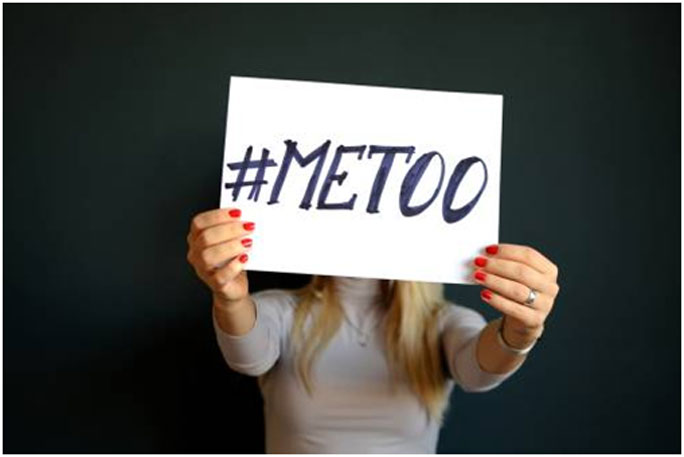
In early October of 2017, The New York Times published a damning article about Hollywood producer Harvey Weinstein and his long history of sexual harassment. The story seemingly opened a floodgate where women came forward to share their own stories, and this resulted in numerous high-profile people from all industries ranging from law to entertainment being ousted from their respective companies. Examples include Roy Price of Amazon Studios, Mark Halperin of MSNBC, and Scott Legg of Wegman Partners, a legal recruiting firm.
The Weinstein scandal also resulted in a viral campaign called “#MeToo” where women wrote the hashtag on their social media if they were ever victims of sexual harassment or assault. Men who viewed themselves as allies noticed their female friends and family’s haunting words, and it prompted them to share their support. One man, actor George Clooney, revealed that his wife, human rights attorney, Amal Clooney, had her own #MeToo experiences with sexual harassment at law firms.
“She's faced those exact kinds of [sexual harassment] situations in law,” Clooney said to Entertainment Tonight. “It’s everywhere and so it needs to be addressed as if it’s a problem for all of us. And we have to take it on full force ‘cause the kind of assault that we're talking about now is – it’s so infuriating that this was allowed to go on as long as it did."
While Amal Clooney had not said anything on the record about her experiences with sexual harassment before, George Clooney’s revelation raised the question of how big of a problem is sexual harassment at law firms? Like the Weinstein scandal, is sexual harassment an open secret? According to legal experts, sexual harassment occurs often at law firms, but many people either do not report it or the cases are settled privately. When sexual harassment cases are filed in court, the results can be mixed.
For instance, in February 2015, a jury ruled that the law firm Faruqi & Faruqi was partially liable for creating a hostile environment for a female attorney named Alexandra Marchuk. Marchuk sued for $9 million but was awarded only $140,000. The plaintiff said that her boss had requested oral sex from her, made vulgar jokes in front of colleagues, and sexually assaulted her at a holiday party. Her attorney stated that Faruqi & Faruqi protected the accused partner Juan Monteverde because he was a rainmaker. The law firm argued that Marchuk made up negative stories about Monteverde because she was obsessed with him and that the two had had a consensual relationship.
“We are aware that the simple and easy course of least resistance is to quell the controversy and suggest that Mr. Monteverde find employment elsewhere,” Faruqi & Faruqi co-founders, Lubna M. Faruqi and Nadeem Faruqi, said in a statement to The New York Times in 2013 when the case was filed. “Although he exercised very poor judgment and has been disciplined by F&F, we are convinced that he did not commit sexual harassment, that our firm is not a hostile workplace, and that he does not deserve to have his promising future forever tarnished by letting these allegations go unanswered.”
Although awarded money, Marchuk’s case was generally viewed as a win for the defense because of the small amount of damages and the length of time it was dragged out. However, because of the case’s high-profile and Marchuk’s willingness to fight, it inspired other women to file their own lawsuits against their law firms shortly after.
While victims of sexual harassment seem to be gaining a voice because of the scandals like Faruqi’s and Weinstein’s, the problem continues, even in the world of law. So what can attorneys do to fight sexual harassment? What can law firms do to stop the problem? How prevalent is sexual harassment in the world of law?
What is sexual harassment?
In the example of Harvey Weinstein, the Miramax founder used his power position to coerce young women for sexual favors, and he tricked several into joining him in his hotel room under the guise that the meetings were professional and that other people would be there. Once in the room, he would pressure them for naked massages or more, and actresses said that he made blatant offers for quid pro quo. Some actresses such as Rose McGowan and Asia Argento even accused the Hollywood mogul of rape. Weinstein got away with this behavior for over three decades; and whenever women complained, he would buy them off with expensive settlements in exchange for non-disclosure agreements.
With Weinstein, his behavior was predatory and allegedly criminal, but that does not mean that one has to be as obvious when committing sexual harassment. Other examples of sexual harassment could include crude comments or showing pornography to a nonconsenting coworker at work. According to the Equal Employment Opportunity Commission (EEOC) both men and women can be victims of sexual harassment, and sexual harassment does not have to be sexual in nature.
“It is unlawful to harass a person (an applicant or employee) because of that person’s sex. Harassment can include “sexual harassment” or unwelcome sexual advances, requests for sexual favors, and other verbal or physical harassment of a sexual nature,” the EEOC stated. “Harassment does not have to be of a sexual nature, however, and can include offensive remarks about a person’s sex. For example, it is illegal to harass a woman by making offensive comments about women in general.”
The EEOC added that sexual harassment is illegal when an environment turns hostile or results in an adverse employment decision like a demotion or firing. They said that sexual harassment can occur between coworkers, a supervisor, clients, and customers.
How prevalent is sexual harassment in law firms?
If lawsuits are any indication, sexual harassment in law firms is a problem that has been going on for a very long time. The industry is well-known for being male-dominated; and although law firms are expected to be places of professionalism and prestige, they are susceptible to the same type of problems that other industries such as entertainment and media face.
“Unfortunately, sexual harassment is a serious issue at law firms, and any claim that sexual harassment is not prevalent in the legal industry is simply wrong,” attorney Dan Kalish of HKM said to LawCrossing.
HKM handles employment issues and sexual harassment cases, and Kalish said that the Los Angeles-based law firm has been involved with several matters against law firms who themselves are in legal trouble of a sexual nature.
These types of cases are nothing new, but according to Law.com, most sexual harassment complaints filed by attorneys against their own law firms are usually not publicized because they are dealt with in arbitration. However, there are a few occurrences of high-profile sexual harassment cases against law firms such as the Faruqi & Faruqi case or the Chadbourne & Parke (now Norton Rose) case. Plus, these lawsuits tend to be hard to win.
“Every study we looked at, including those about the legal profession, say that 40 percent of women will or have experience harassment. If you look at studies of law firms, two-thirds say they’ve seen it or experienced it,” Professor Joanna L. Grossman at Southern Methodist University told Law.com.
According to Grossman, employment discrimination cases are some of the hardest to win because most courts don’t investigate the grievance procedure and law firms have no problems dragging out cases because they handle their own litigation. Thus, they don’t “feel the heat of legal expenses.”
What can law firms do to prevent sexual harassment?
Sexual harassment training is commonly given to new employees or given as workplace continuing education. The effectiveness of the training has been put into question, however, because sexual harassment still occurs. Reasons for this are that people are still unaware of what constitutes sexual harassment, despite the training, or they know and misbehave anyway.
Besides training, employment attorney and investigator, Amy Oppenheimer, told NPR that what law firms actually do when complaints are filed and how leaders act are the factors that actually prevent sexual harassment.
“A lot of the people who are abusing the rules are people who do have more power than those who are enforcing them. And if you don't have people who are enforcing them who have more power, then inevitably you're not going to have the kind of change that we would want to see,” Oppenheimer said.
Why is sexual harassment not reported?
Women are 90% of the targets of sexual harassment, according to Professors Joanna L. Grossman and Deborah L. Rhode who published a study about the topic in the Harvard Business Review. Choosing to report sexual harassment is a burden for victims because there are often costs of complaining such as retaliation or embarrassment to their reputation. Grossman and Rhode stated that almost 50-60% of women who report sexual harassment have been retaliated against.
The professors stated that women who do file sexual harassment lawsuits often lose their cases because employers are only required in court to show that they made efforts to prevent harassment. Then the onus to stop the behavior is unfairly on the victim to prevent harm.
“Employers are strictly liable for harassment by a supervisor that results in a tangible employment action. An example would be a manager who fires a subordinate for refusing to sleep with him. For harassment that does not result in such a tangible action, employers can avoid liability by establishing an affirmative defense. In effect, they must show that they took reasonable measures to prevent and correct harassment and that the victim failed to take advantage of opportunities to avoid harm,” Grossman and Rhode wrote.
“In theory, the burden is on the employer to show why liability is not appropriate, rather than the converse. In practice, however, courts have time and again granted employers the benefit of the affirmative defense without ever inquiring whether the measures they took to prevent or respond to harassment were effective. The law too often gives employers a safe harbor.”
With the costs of reporting outweighing the benefits of change, many victims choose to suffer in silence or quit their jobs.
What should an attorney do if they believe they are a victim of sexual harassment?
As mentioned above, sexual harassment does not have to be as severe as unconsented touching or blatant requests for quid-pro-quo to create a hostile work environment. Sometimes it can be an inappropriate comment or touch that leads to a feeling of discomfort or shame. If you feel as if you have been sexually harassed, say something to the person immediately such as “I’m uncomfortable with that behavior” or “I feel that’s inappropriate.” Sometimes that is enough to make the person stop for good, and you may not feel the need to report it to your superiors, although you should document it in case it happens again.
If it does happen again, immediately report the action to management.
“Even if the employee is convinced reporting the incident will do nothing, she should still report it. Courts typically ask whether the victim filed an internal complaint, and if not, why not. If she waited to complain, they ask why and for how long, and are unwilling to accept the most obvious and compelling reasons. A delay of even a few days can be deemed “unreasonable,” and fears of retaliation are frequently dismissed as too vague and “generalized” to justify the failure to complain,” Joanna Grossman and Deborah Rhode stated in The Harvard Business Review.
Grossman, Rhode, Tom Spiggle of the Spiggle Law Firm, and Pam Teren of the Teren Law Group shared recommendations on what to do if you have been a victim of sexual harassment at work.
5 Steps to Fighting Sexual Harassment at Law Firms
1. Report the sexual harassment to management.
Most firms have some type of process in place to handle sexual harassment. However, if your firm does not have an official policy, report the sexual harassment in writing to Human Resources and management, even if you believe the company will not do anything to help you. If you end up filing a lawsuit, you must show that you made an effort to follow company policy and procedure.
2. Document the sexual harassment.
Veronica McIlraith stated that she was sexually harassed at legal recruiting firm Wegman Partners for three years before she filed a complaint with New York City. During that period of time, she took photographs of her boss’s alleged inappropriate behavior which included passing out in tiny shorts in the open office area, drawing a penis at work, and posting a sign that said “Suck my balls” in the interior window of his office. Additionally, she kept a detailed log of dates and descriptions of his actions that she submitted to her attorney. In October of 2017, news of McIlraith’s complaint surfaced, and her boss, Scott Legg, was fired.
Others who experience sexual harassment at work should also document instances of impropriety with emails, text screenshots, photographs or recordings. When it comes to recording, Spiggle said to check on laws in your state to find out whether or not it is illegal to do so without the second party’s consent.
If for any reason you cannot obtain the evidence listed, then email yourself what had happened that day using your personal account and keep a log. Also, inform your friends or trusted colleagues about what is going on so that others are aware of this problem.
3. Talk to an experienced sexual harassment lawyer.
Obstacles women encounter when meeting with Human Resources is that HR either doesn’t take their claim seriously or their interest is to protect the company, not the victim. Teren said it is a good idea for people who are being harassed at work to consult with an attorney, who will be able to provide advice and keep the conversation confidential.
“It’s always a good idea to get legal advice, even if you are an attorney,” Teren told Law Crossing. “Unless you specialize in employment law, you likely don’t have the knowledge or experience in this particular type of case, so advice is valuable. Typically, a victim should report the conduct, but how it is reported is important, so getting advice is a good idea.”
4. File a claim with the EEOC.
After informing your company of the complaint, Spiggle said to contact The Equal Employment Opportunity Commission. The EEOC will investigate your claim independently and contact your employer to hopefully resolve the issue. Spiggle said that the EEOC may not end up being able to change your environment in reality, but filing with them will protect your claim if you decide to file a lawsuit in the future.
5. Seek out others who were sexually harassed by the abuser.
In the cases of Harvey Weinstein, Roger Ailes, and Bill O’Reilly, women collectively shared their sexual harassment experiences; and the court of public opinion ruled that these men were despicable, which prompted their respective companies to fire them. So while some women may have a hard time winning a case in court, they can still change their workplace by going public with their account, according to Grossman and Rhode.
Conclusion
There have been numerous high-profile sexual harassment cases in various industries, and law firms are not immune. The majority of sexual harassment victims are women, and the problem will not go away with just training. It requires people to be role models and enforce policies when accusers make reports.
“You wouldn't expect to see the level of sexual harassment and sexual assault and abuse that is still prevalent. And I think that when you're talking about matters of gender issues and sexual issues, they're much harder to get at when you combine it with power, that obviously the law isn't enough, that people really do need to stand up and behave differently and make sure that the people around them are behaving differently,” attorney Amy Oppenheimer told NPR.
And for those targets who are not able to resolve their problems through human resources, speaking up is one way to stop the culture of sexual harassment at law firms.
“If you don’t get these cases out there and embarrass companies, nothing will ever change,” journalist Susan Antilla told Law360.
See the following articles for more information:
- The 9 Most Important Characteristics of the Best Law Firm Training Programs
- Effective Teamwork Strategies for Law Firms
- Self-delusion among Law Firms





